

Rubik’s Cube Inventor Opens Up About His Creation in New Book 'Cubed' “On the way to trying to understand the nature of the cube, I changed my mind,” Rubik said.
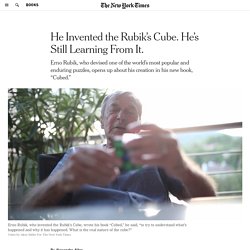
“What really interested me was not the nature of the cube, but the nature of people, the relationship between people and the cube.” Reading “Cubed” can be a strange, disorienting experience, one that’s analogous to picking up and twisting one of his cubes. It lacks a clear narrative structure or arc — an effect that’s deliberate, Rubik said. Initially, he didn’t even want the book to have chapters or even a title. “I had several ideas, and I thought to share this mixture of ideas that I have in my mind and leave it to the reader to find out which ones are valuable,” he said.
Thomas Young (scientist) Young is credited with establishing the wave theory of light, influenced in his experiments by those of Isaac Newton.
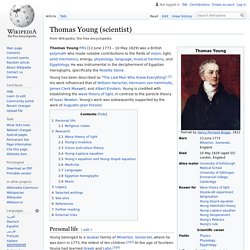
His work was subsequently supported by the work of Augustin-Jean Fresnel. Sacred to the memory of Thomas Young, M.D., Fellow and Foreign Secretary of the Royal Society Member of the National Institute of France; a man alike eminent in almost every department of human learning. Patient of unintermitted labour, endowed with the faculty of intuitive perception, who, bringing an equal mastery to the most abstruse investigations of letters and of science, first established the undulatory theory of light, and first penetrated the obscurity which had veiled for ages the hieroglyphs of Egypt.
Endeared to his friends by his domestic virtues, honoured by the World for his unrivalled acquirements, he died in the hopes of the Resurrection of the just. — Born at Milverton, in Somersetshire, 13 June 1773. Walter Rodney. Walter Anthony Rodney (23 March 1942 – 13 June 1980) was a prominent historian, political activist and scholar from Guyana.
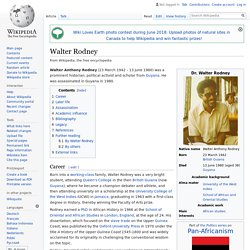
He was assassinated in Guyana in 1980. Career[edit] Ada Lovelace - Wikipedia. English mathematician and computer programming pioneer Augusta Ada King, Countess of Lovelace (née Byron; 10 December 1815 – 27 November 1852) was an English mathematician and writer, chiefly known for her work on Charles Babbage's proposed mechanical general-purpose computer, the Analytical Engine.
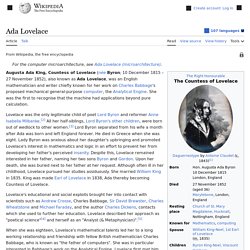
She was the first to recognise that the machine had applications beyond pure calculation, and to have published the first algorithm intended to be carried out by such a machine. As a result, she is often regarded as the first computer programmer.[3][4] Ada Byron was the only child of poet Lord Byron and Lady Byron.[5] All of Byron's other children were born out of wedlock to other women.[6] Byron separated from his wife a month after Ada was born and left England forever four months later. He commemorated the parting in a poem that begins, "Is thy face like thy mother's my fair child! Marcelino Sanz de Sautuola - Wikipedia. Altamira cave[edit] The Altamira cave, now famous for its unique collection of prehistoric art, was well known to local people, but had not been given much attention until in 1868, when it was "discovered" by the hunter Modesto Peres.
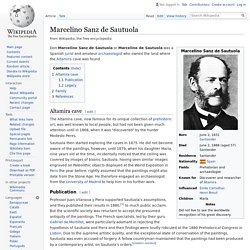
Sautuola then started exploring the caves in 1875. He did not become aware of the paintings, however, until 1879, when his daughter Maria, nine years old at the time, incidentally noticed that the ceiling was covered by images of bisons.
Juana Inés de la Cruz. Sister (Spanish: Sor) Juana Inés de la Cruz, O.S.H. (English: Joan Agnes of the Cross) (12 November 1651 – 17 April 1695), was a self-taught scholar and poet of the Baroque school, and Hieronymite nun of New Spain. Although she lived in a colonial era when Mexico was part of the Spanish Empire, she is considered today both a Mexican writer and a contributor to the Spanish Golden Age, and she stands at the beginning of the history of Mexican literature in the Spanish language. Early life[edit] A portrait of Juana during her youth in 1666, which states she was 15 at the time, when she first entered the viceregal court She was born Juana Inés de Asbaje y Ramírez de Santillana in San Miguel Nepantla (now called Nepantla de Sor Juana Inés de la Cruz in her honor) near Mexico City. Dr. Susan Blackmore. Rosa Luxemburg.
Rosa Luxemburg (also Rozalia Luxenburg; Polish: Róża Luksemburg; 5 March 1871[1] – 15 January 1919) was a Marxist theorist, philosopher, economist and revolutionary socialist of Polish Jewish descent who became a naturalized German citizen.
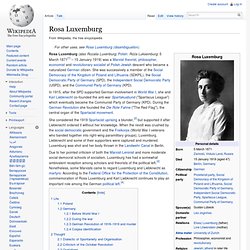
She was successively a member of the Social Democracy of the Kingdom of Poland and Lithuania (SDKPiL), the Social Democratic Party of Germany (SPD), the Independent Social Democratic Party (USPD), and the Communist Party of Germany (KPD). In 1915, after the SPD supported German involvement in World War I, she and Karl Liebknecht co-founded the anti-war Spartakusbund ("Spartacus League") which eventually became the Communist Party of Germany (KPD). Petrarch. Santa Maria della Pieve in Arezzo Original lyrics by Petrarch, found in 1985 in Erfurt Biography[edit]
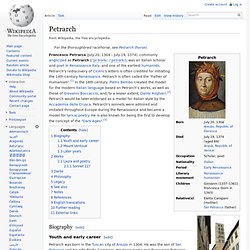
Eratosthenes. Eratosthenes of Cyrene (Ancient Greek: Ἐρατοσθένης, IPA: [eratostʰénɛːs]; English /ɛrəˈtɒsθəniːz/; c. 276 BC[1] – c. 195/194 BC[2]) was a Greek mathematician, geographer, poet, astronomer, and music theorist.
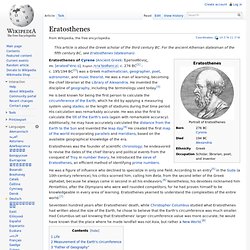
Enheduanna. Regarded by literary and historical scholars as possibly the earliest known author and poet, Enheduanna served as the High Priestess during the third millennium BCE.[1] She was appointed to the role by her father, King Sargon of Akkad.
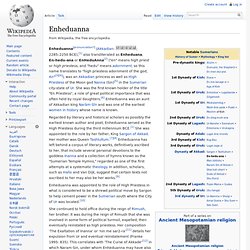
Her mother was Queen Tashlultum.[7][8] Enheduanna has left behind a corpus of literary works, definitively ascribed to her, that include several personal devotions to the goddess Inanna and a collection of hymns known as the "Sumerian Temple Hymns," regarded as one of the first attempts at a systematic theology. In addition, scholars, such as Hallo and Van Dijk, suggest that certain texts not ascribed to her may also be her works.[9] Alan Watts. Anthony B. Pinn.
Science. Ptolemy. Background[edit] Engraving of a crowned Ptolemy being guided by the muse Astronomy, from Margarita Philosophica by Gregor Reisch, 1508.
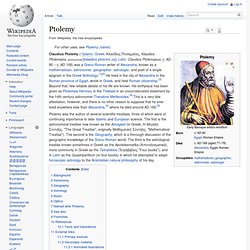
Although Abu Ma'shar believed Ptolemy to be one of the Ptolemies who ruled Egypt after the conquest of Alexander the title ‘King Ptolemy’ is generally viewed as a mark of respect for Ptolemy's elevated standing in science.